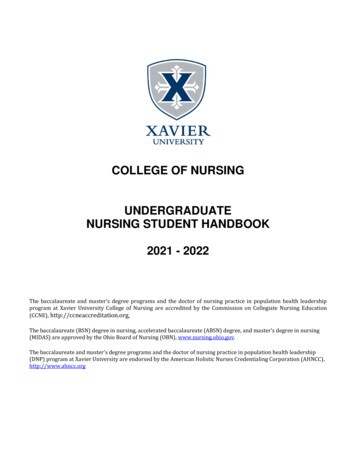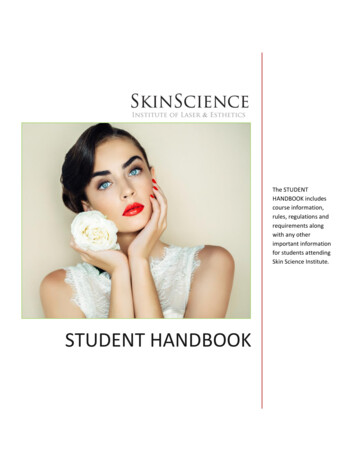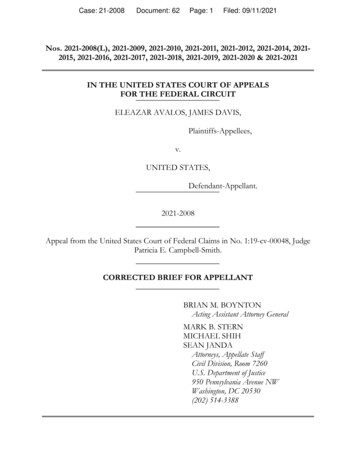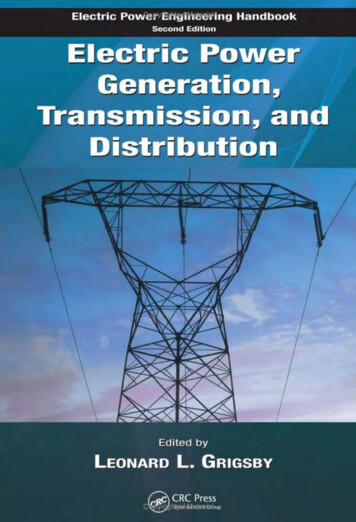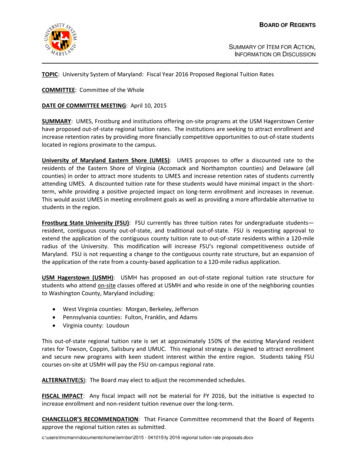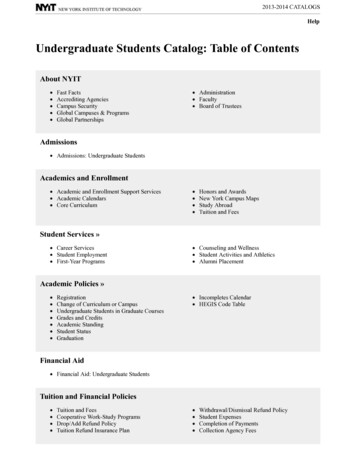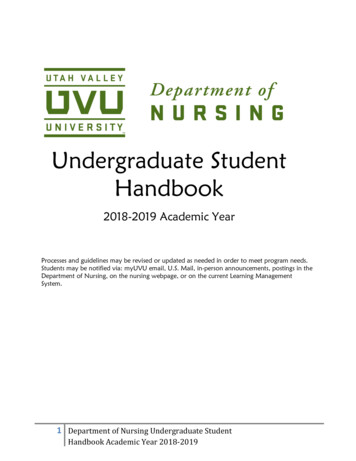
Transcription
Undergraduate Handbook2020-2021 EditionDepartment of Computer ScienceCalifornia State University, FullertonDraft: August 17, 2020
2
Contents1Introduction71.1The Field of Computer Science . . . . . . . . . . . . . . . . . . . . . . . . . . . . . . . . . . . . . .71.2The Department . . . . . . . . . . . . . . . . . . . . . . . . . . . . . . . . . . . . . . . . . . . . . .71.3Accreditation . . . . . . . . . . . . . . . . . . . . . . . . . . . . . . . . . . . . . . . . . . . . . . .81.4The Programs . . . . . . . . . . . . . . . . . . . . . . . . . . . . . . . . . . . . . . . . . . . . . . .81.5Objectives and Outcomes . . . . . . . . . . . . . . . . . . . . . . . . . . . . . . . . . . . . . . . . .91.6Using This Document . . . . . . . . . . . . . . . . . . . . . . . . . . . . . . . . . . . . . . . . . . .92Sources of Information113The CS Major133.1Major Requirements at a Glance . . . . . . . . . . . . . . . . . . . . . . . . . . . . . . . . . . . . .133.2Major Prerequisite Tree . . . . . . . . . . . . . . . . . . . . . . . . . . . . . . . . . . . . . . . . . .133.3Lower-Division Core . . . . . . . . . . . . . . . . . . . . . . . . . . . . . . . . . . . . . . . . . . .143.4Tuffix . . . . . . . . . . . . . . . . . . . . . . . . . . . . . . . . . . . . . . . . . . . . . . . . . . .153.5Mathematics Requirements . . . . . . . . . . . . . . . . . . . . . . . . . . . . . . . . . . . . . . . .153.6Science and Mathematics Electives . . . . . . . . . . . . . . . . . . . . . . . . . . . . . . . . . . . .163.7Upper Division Core . . . . . . . . . . . . . . . . . . . . . . . . . . . . . . . . . . . . . . . . . . .163.8Computer Science Major Electives . . . . . . . . . . . . . . . . . . . . . . . . . . . . . . . . . . . .163.8.118Elective Specializations . . . . . . . . . . . . . . . . . . . . . . . . . . . . . . . . . . . . .3
3.9456B.S. in Computer Science with Cybersecurity Concentration . . . . . . . . . . . . . . . . . . . . . .183.10 General Education (GE) . . . . . . . . . . . . . . . . . . . . . . . . . . . . . . . . . . . . . . . . .183.11 Academic Requirements . . . . . . . . . . . . . . . . . . . . . . . . . . . . . . . . . . . . . . . . .213.11.1 Grades . . . . . . . . . . . . . . . . . . . . . . . . . . . . . . . . . . . . . . . . . . . . . .21The CS Minor234.1Minor Requirements at a Glance . . . . . . . . . . . . . . . . . . . . . . . . . . . . . . . . . . . . .234.2Minor Prerequisite Tree . . . . . . . . . . . . . . . . . . . . . . . . . . . . . . . . . . . . . . . . . .244.3For Majors in Related Fields . . . . . . . . . . . . . . . . . . . . . . . . . . . . . . . . . . . . . . .24Alternative Pathways255.1Transfer . . . . . . . . . . . . . . . . . . . . . . . . . . . . . . . . . . . . . . . . . . . . . . . . . .255.2Computer Science Placement Examination . . . . . . . . . . . . . . . . . . . . . . . . . . . . . . . .285.3Missing CPSC 120 or 121 . . . . . . . . . . . . . . . . . . . . . . . . . . . . . . . . . . . . . . . .285.4Advanced Placement (AP) . . . . . . . . . . . . . . . . . . . . . . . . . . . . . . . . . . . . . . . .285.5Internships . . . . . . . . . . . . . . . . . . . . . . . . . . . . . . . . . . . . . . . . . . . . . . . . .285.6International Students . . . . . . . . . . . . . . . . . . . . . . . . . . . . . . . . . . . . . . . . . . .295.7ROTC . . . . . . . . . . . . . . . . . . . . . . . . . . . . . . . . . . . . . . . . . . . . . . . . . . .295.8Independent Study . . . . . . . . . . . . . . . . . . . . . . . . . . . . . . . . . . . . . . . . . . . .305.9Petitioning for Classes . . . . . . . . . . . . . . . . . . . . . . . . . . . . . . . . . . . . . . . . . .305.10 Request Forms . . . . . . . . . . . . . . . . . . . . . . . . . . . . . . . . . . . . . . . . . . . . . .30Advisement336.1General Advice . . . . . . . . . . . . . . . . . . . . . . . . . . . . . . . . . . . . . . . . . . . . . .336.2Major Advisement . . . . . . . . . . . . . . . . . . . . . . . . . . . . . . . . . . . . . . . . . . . .336.3Required Advisement . . . . . . . . . . . . . . . . . . . . . . . . . . . . . . . . . . . . . . . . . . .346.4General Education (GE) Advisement . . . . . . . . . . . . . . . . . . . . . . . . . . . . . . . . . . .346.5First-time Freshmen . . . . . . . . . . . . . . . . . . . . . . . . . . . . . . . . . . . . . . . . . . . .344
6.6Career Advising . . . . . . . . . . . . . . . . . . . . . . . . . . . . . . . . . . . . . . . . . . . . . .346.7Studying Abroad . . . . . . . . . . . . . . . . . . . . . . . . . . . . . . . . . . . . . . . . . . . . .346.8Transfer Students . . . . . . . . . . . . . . . . . . . . . . . . . . . . . . . . . . . . . . . . . . . . .356.9Nearing Graduation (Within One Year) . . . . . . . . . . . . . . . . . . . . . . . . . . . . . . . . . .356.10 Probation . . . . . . . . . . . . . . . . . . . . . . . . . . . . . . . . . . . . . . . . . . . . . . . . .356.11 Peer Advising & Clubs . . . . . . . . . . . . . . . . . . . . . . . . . . . . . . . . . . . . . . . . . .357Progress Flowcharts378Credits and Revision History41Index435
6
1Introduction1.1The Field of Computer ScienceComputer Science is the systematic study of computing systems and computation. The body of knowledge containsthe theoretical foundation for understanding computing systems, design methodology, algorithms, and software andhardware tools, as well as application development in a variety of different areas.Our corriculum covers a wide range of areas, including: multimedia and digital game technologies, Internet and enterprise computing, wireless and mobile computing, databases and data mining, computer security, software engineering, and computational bioinformatics.Computer Science prepares graduates for rewarding careers in all areas of business, government, education and industry. These organizations, large and small, need computer professionals to address their needs with specific programsand systems. Computer science professionals tackle complicated problems and create computer solutions to solvethem, devising new ways to use computers. Computer Science has advanced to almost every aspect of society anddeveloped services to make life better.1.2The DepartmentThe faculty and staff of the Computer Science Department welcome you into our program and sincerely wish yougood luck on your journey into higher education, and continued success. Whenever you have a question about the7
Department—its policies, its curriculum, its services, your progress, or anything else—feel free to contact us.Web:E-mail:In person:Telephone:Fax:Postal rton.eduRoom CS-522(657) 278-3700(657) 278-7168California State University, FullertonDepartment of Computer ScienceP.O. Box 6870Fullerton, CA 92834-6870AccreditationThe Bachelor of Science in Computer Science degree at CSUF is accredited by the Computing Accreditation Commission of ABET (http://www.abet.org).1.4The ProgramsThe Department offers the following Undergraduate programs, which are documented in this Handbook:1. Bachelor of Science in Computer Science (B.S. CS),2. Bachelor of Science in Computer Science with Concentration in Cybersecurity, and3. Minor in Computer Science.The Department also offers Graduate programs, which are documented elsewhere:1. Master of Science in Computer Science (M.S. CS),2. Master of Science in Software Engineering (M.S.E.), and3. Accelerated Master of Science in Software Engineering (A.M.S.E.).CS courses are also components of Computer Engineering, Electrical Engineering, and Mathematics programs atCSUF.8
1.5Objectives and OutcomesThe Program Educational Objectives and Program Outcomes for the CS B.S. are documented 1.6Using This DocumentThis handbook covers information on how to complete a B.S. or a Minor in Computer Science, and contains information relevant to students pursuing them. If you are pursuing a Masters degree, please refer to the Graduate Handbookinstead of this document.In order to minimize duplicated information, this document references other documents rather than copying theircontents. The PDF version of this Handbook presents these references as clickable links. Some aspects of our programsare complex, and you may find it difficult to choose among alternatives. In those cases, we present our suggesteddefault choice as a tip, as shown below. You are not required to follow these tips, but doing so is often a prudentchoice.TIPWhen in doubt, heed tips such as this one.This document has been formatted so that it may be printed as a booklet. Print double-sided with staples (or otherbinding) on the left side. The document will look best if printed in color, but it may also be printed in grayscale (a.k.a.semitone).9
10
2Sources of InformationYou may find the following sources to be helpful. The University Catalog: http://catalog.fullerton.edu/ Advising:– CS Department /advisement.php– Center for Academic Support in ECS secs.php– Student Success entSuccessCenter.php– Academic Advisement Center (GE advising): https://www.fullerton.edu/aac/ Department of Computer Science: http://www.fullerton.edu/ecs/cs/ General Education l education/index.php Course transfer database: http://www.assist.org Center for Internships & Community Engagement — Academic /internships.php Catalogs of nearby community colleges:– Cypress llegeCatalog.aspx– Fullerton College: http://www.fullcoll.edu/catalog– Golden West College: http://www.goldenwestcollege.edu/catalog/– Irvine Valley College: �� Orange Coast s/CourseCatalog/Pages/default.aspx11
– Saddleback College: http://www.saddleback.edu/cc/course-catalog– Santa Ana es/catalog.aspx– Santiago Canyon dmissions/Pages/CATALOGSCHEDULE.aspx12
3The CS Major3.1Major Requirements at a GlanceThe requirements for the CS B.S. are detailed in the University Cataloghttps://catalog.fullerton.edu/preview program.php?catoid 61&poid 28640&returnto 7397The requirements fit into 6 categories:1. Lower-Division Core: 100/200-level CPSC courses covering computer programming and data structures.2. Mathematics Requirements: MATH courses laying the foundation for CS theory and practice.3. Science and Mathematics Electives: Physical science and/or mathematics courses that provide a breadth ofscientific knowledge and prepare students for certain upper-division electives.4. Upper-Division Core: 300/400-level CPSC courses that build directly upon the Lower-Division Core, Mathematics, and Science courses lised above, and complete the computer science canon.5. Major Electives: You may choose 15 units (ordinarily 5 courses) that support your interests and career goals.6. General Education (GE): A blend of varied topics that round out a broad, liberal arts education, and satisfyUniversity graduation requirements.Our accreditor, ABET, requires at least 30 units of mathematics and science courses. The Mathematics Requirementsand Science and Mathematics Electives together satisfy this 30-unit requirement.3.2Major Prerequisite TreeThe following tree graph diagram illustrates the prerequisite and corequisite relationships between courses requiredfor the major.13
TIP3.3You are ordinarily limited to 16 units each term. In order to finish the B.S. program in 8semesters, you will need to take five classes each semester. Almost all CPSC and GE coursesare 3 units each; almost all mathematics and science courses are 4 units each. Plan on takingfour 3-unit courses (CPSC and/or GE), and one 4-unit course (mathematics or science) eachsemester, for a total of 16 units, until you have completed all required 4-unit courses.Lower-Division CoreThe first three courses in the major are CPSC 120, 121, and 131. These courses must be taken in sequence, and areprerequisites to practically every other CS course.TIPPrioritize completing CPSC 120, 121, then 131 as soon as possible.14
If you come to CSUF with prior programming expertise, you may be able to skip some of these courses. See sections5.2 and 5.4 for more information.Our introductory programming courses are taught in C , but cover concepts that are common to practically allprogramming languages. To establish some breadth of programming fluency, you are required to learn a secondprogramming language. This is accomplished by passing one of the CPSC 223 courses.TIP3.4Choose CPSC 223C - C Programming if you plan on taking security-related courses later on.TuffixStudents enrolled in CSPC 120, CPSC 121, and CPSC 131 are recommended to use the Computer Science Department’s official GNU/Linux development environment, Tuffix. Tuffix is Tuffy the Titan’s Linux distribution.Instructions on how to install Tuffix or a Tuffix based VM are online at http://csufcs.com/tuffixinstall.The Tuffix Titanium Community for Students, id 1547 is the best venue to receive help with Tuffix. Students may self-enroll in the community; first loginto your portal, then navigate to Titanium communities, next under the dashboard to the left click Site home, then clickSearch Courses on the right, search for Tuffix, in the results click Tuffix Students, under the gear in the upper rightselect Enrol me in this course, finally click on the button Enrol me. You may unenroll at any time.The Tuffix home page is https://github.com/kevinwortman/tuffix.Students interested in using Microsoft development tools may request a Dreamspark account at http://dsreqform.ecs.fullerton.edu/. A student may, at no monetary cost, download full featured versions of Microsoft VisualStudio.Students interested in using Apple development tools can freely download Xcode through the App Store application bundled with macOS. Students may download Xcode directly from https://developer.apple.com/xcode/.A CentOS-based shell server is available through secure shell (ssh) and secure file transfer protocol (sftp). The hostname is ecs.fullerton.edu. If your email address is malcolm@csu.fullerton.edu, then your username is malcolm.If you are using a command-line ssh client, then your command to connect to ecs.fullerton.edu will be ‘ssh malcolm@ecs.fullerton.edu‘.3.5Mathematics RequirementsBefore enrolling in Math 150A, you must either have recently passed MATH 125 - Precalculus, an equivalent courseat another institution, or passed the Mathematics Qualifying Exam. Additional information on this exam is availablein the online registration guide, and from the Fullerton Testing Center, Gordon Hall 229, and (657) 278-3838.15
3.6Science and Mathematics ElectivesAs stated in the University Catalog, you must complete at least 12 units of natural science and/or mathematics courseschosen from a designated list. The list includes only courses that dovetail with CS material, and may fit within acoherent 12-unit curriculum. Due to GE and ABET requirements, you must take at least one course with a laboratoryexperience. Eligible laboratory courses are designated in the Catalog.Choose a set of courses that support each other and your future studies. Plan ahead, and discuss your plan for thisrequirement with your adviser.TIPPHYS 225, 225L, 226, 226L, and MATH 250A provide a strong foundation for later CS courses,meet all Science and Mathematics requirements, and fit within 12 units. Take this set of electivesunless you are working toward a specific study plan focusing on biology, chemistry, geology, ormathematics.The two-semester biology sequence is BIOL 151 and BIOL 152. This sequence replaced older courses numberedBIOL 171 and 172. Current students should take 151 and 152, but you may see references to 171 and 172 in somedocuments. Students who took 171 and 172 while they were offered may count those courses toward the Science andMathematics Electives requirement.3.7Upper Division CoreCPSC 481 - Artificial Intelligence is the Core course with the longest chain of prerequisites. Plan your schedule sothat you make steady progress toward meeting 481’s prerequisites.If possible, make progress on each of the following prerequisite chains every semester:1. CPSC 120, 121, 131, 335, 481TIP2. MATH 270A, 270B3. MATH 150A, 150B, 3383.8Computer Science Major ElectivesYou must select 15 units of electives, ordinarily five 3-unit courses, to satisfy your degree requirements. Select electivecourses that are best aligned to your personal objectives. For example, if you aspire to create web applications andmobile apps, then courses such as CPSC 411, CPSC 349 and CPSC 449 are excellent choices. Consult mentors andadvisors in selecting the elective courses that match your goals.Courses outside of the computer science department may be used as elective courses. You must seek approval from a16
major advisor before taking the course.You may complete at most 3.0 units of Lower Division CS Electives. Students who need additional units due to thePlacement Examination, transfer, or other circumstances are encouraged to consult with a major advisor and selectupper division CS Electives.Your are required to complete at least 15.0 units of CS Electives. You may need to take additional electives if you areshort on units due to the Placement Examination, transfer, or other circumstances.A course may be used as an Upper Division CS Elective if it is a 3-unit, upper-division, CPSC course that is not anUpper Division Core requirement. Therefore, the following courses may count as Upper Division CS Electives: CPSC 301 - Programming Lab Practicum (2) CPSC 349 - Web Front-End Engineering (3) CPSC 375 - Introdution to Data Science and Big Data (3) CPSC 386 - Introduction to Game Design and Production (3) CPSC 411 - Mobile Device Application Programming (3) CPSC 431 - Database and Applications (3) CPSC 439 - Theory of Computation (3) CPSC 440 - Computer System Architecture (3) CPSC 449 - Web Back-End Engineering (3) CPSC 452 - Cryptography (3) CPSC 454 - Cloud Computing and Security (3) CPSC 455 - Web Security (3) CPSC 456 - Network Security Fundamentals (3) CPSC 458 - Malware Analysis (3) CPSC 459 - Blockchain Technologies (3) CPSC 462 - Software Design (3) CPSC 463 - Software Testing (3) CPSC 464 - Software Architecture (3) CPSC 466 - Software Process (3) CPSC 474 - Parallel and Distributed Computing (3) CPSC 479 - Introduction to High Performance Computing (3) CPSC 483 - Introduction to Machine Learning (3) CPSC 484 - Principles of Computer Graphics (3) CPSC 485 - Computational Bioinformatics (3)17
CPSC 486 - Game Programming (3) CPSC 489 - Game Development Project (3) CPSC 499 - Independent Study (1 - 3) EGGN 495 - Professional Practice (1-3) MATH 335 - Mathematical Probability (3) MATH 340 - Numerical Analysis (3) MATH 370 - Mathematical Model Building (3)You may be able to use an adviser-approved course not on this list as an Upper Division CS Elective. Such a coursemust be at least 3 units and directly related to your academic goals. If this interests you, discuss it with a major adviser.You may need to file a request form; see Section 5.10.3.8.1Elective SpecializationsStudents wanting for guidance in choosing electives are advised to complete one of the following Specializations.Each Elective Specialization is a curated set of Major Electives focusing on a vital branch of Computer Science. Cybersecurity: CPSC 452, 454, 455, 456, 458, and 459. Data Science and Artificial Intelligence: CPSC 375, 483, and 485; MATH 370 Game Development: CPSC 386, 484, 486, and 489 Software Engineering: CPSC 462, 463, 464, and 466 Theory: CPSC 439, MATH 340, and MATH 370 (take MATH 250A B as Science and Mathematics Electivesto satisfy the MATH prerequisites) Web and Mobile Applications: CPSC 349, 411, 431, and 4493.9B.S. in Computer Science with Cybersecurity ConcentrationIn addition to the university and departmental requirements, the B.S. in Computer Science with Cybersecurity Concentration requires the completion of the following courses: CPSC 456 (Network Security Fundamentals) AND Threeelectives chosen from the followings: CPSC 452 (Cryptography), CPSC 454 (Cloud Computing and Security), CPSC455 (Web Security), CPSC 458 (Malware Analysis), and CPSC 459 (Block-chain Technologies).3.10General Education (GE)The Undergraduate Studies & General Education ral education/index.phpdescribes University GE requirements in detail.18
Table 3.1: Pre-2018 GE WaiversGE areaA.3. Critical Thinking (3 units)B.1. Physical Science (3 units)Satisfied bywaived for CS majorsGEOL 101, PHYS 225, or CHEM 120A, part of Science and Mathematics Electiveswaived for CS majorsGEOL 101L or PHYS 225L, part of Science and Mathematics ElectivesMATH 150A, part of Mathematics RequirementsB.2. Life Science (3 units)B.3. Laboratory ExperienceB.4. Mathematics and Quantitative Reasoning (3units)B.5. Implications and Explorations of Mathematicsand Natural Sciences (3 units)D.2. World Civilizations and Cultures (3 units)MATH 338, part of Mathematics Requirementswaived for CS majors who take HIST 110A to satisfyC.4waived for CS majorswaived for CS majorsD.5. Explorations in Social Sciences (3 units)E. Lifelong Learning and Self Development (3 units)Total: 24 units, 9 categoriesBeginning in Fall 2018, CSUF students are ordinarily required to take at least 48 units and 18 categories of GE courses.CS majors meet some of these requirements through their required courses, and some requirements are waived for CSmajors. This leaves 27 units and 10 categories which must be satisfied by additional courses.In addition, CSUF students are required to take at least 6 units of GE at the upper-division (300/400) level. 4 of theseare satisfied by MATH 338, so at least 2 of your additional GE units must be upper-division. The following two tablelists the remaining GE categories, and a suggested course for each category.TIPEffective Fall 2017, upper-division GE courses can only be taken by students at upper-divisionclass standing.TIPTo conserve units, make sure that the course you take for category C.3 (pre-2018) or C.4 (2018and later) is upper-division and also satisfies category Z. Z-category courses are marked withan asterisk on the GE course page.TIPCatalog years Fall 2015 through Spring 2018, CS majors must satisfy GE area D.1 withEGCE/CP/EE/ME 401. Starting in Fall 2018, CS majors may use any D.1 course.19
Table 3.2: Fall 2018 and Later GE WaiversGE areaA.3. Critical Thinking (3 units)B.1. Physical Science (3 units)Satisfied bywaived for CS majorsGEOL 101, PHYS 225, or CHEM 120A, part of Science and Mathematics Electiveswaived for CS majorsGEOL 101L or PHYS 225L, part of Science and Mathematics ElectivesMATH 150A, part of Mathematics RequirementsB.2. Life Science (3 units)B.3. Laboratory ExperienceB.4. Mathematics and Quantitative Reasoning (3units)B.5. Implications and Explorations of Mathematicsand Natural Sciences (3 units)D.4. Explorations in Social Sciences (3 units)E. Lifelong Learning and Self Development (3 units)Total: 18 units, 6 categoriesMATH 338, part of Mathematics Requirementswaived for CS majorswaived for CS majorsTable 3.3: Pre-2018 GE Requirements & SuggestionsGE areaA.1. Oral Communications (3 units)A.2. Written Communications (3 units)C.1. Introduction to Art (3 units)C.2. Introduction to Humanities (3 units)Suggested CourseHCOM 102 Public Speaking (3)ENGL 101 - Beginning College Writing (3)ART 101 - Introduction to Art (3) (many alternatives)LING 106 - Language and Linguistics (3); many alternativesMUS 303 - World Music (3); C.1 is prerequisite; manyalternativesHIST 110A - World Civilizations to the 16th Century(3)EGCE/CP/EE/ME 401; MATH 150A is prerequisite;must be 401 specificallyAMST 201 - Introduction to American Studies (3);many alternativesPOSC 100 - American Government (3)already satisfied by MUS 303 aboveC.3. Explorations of Arts and Humanities (3 units)C.4. Origins of World Civilization (3 units)D.1. Introduction to Social Sciences (3 units)D.3. American History, Institutions and Values (3units)D.4. American Government (3 units)Z. Cultural DiversityTotal: 27 units, 10 categories20
Table 3.4: 2018 and later GE Requirements & SuggestionsGE areaA.1. Oral Communications (3 units)A.2. Written Communications (3 units)C.1. Introduction to Art (3 units)C.2. Introduction to Humanities (3 units)Suggested CourseHCOM 102 Public Speaking (3)ENGL 101 - Beginning College Writing (3)ART 101 - Introduction to Art (3); many alternativesLING 106 - Language and Linguistics (3); many alternativesHIST 110A - World Civilizations to the 16th Century(3)MUS 303 - World Music (3); many alternativesSOCI 101 - Introduction to Sociology (3) orEGCE/CP/EE/ME 401; many alternativesHIST 190 Survey of American History with Emphasison Ethnic Minorities (3); many alternativesPOSC 100 - American Government (3)already satisfied by MUS 303 above; many alternativesC.3. Origins of World Civilization (3 units)C.4. Explorations of Arts and Humanities (3 units)D.1. Introduction to Social Sciences (3 units)D.2. American History, Institutions, and Values (3units)D.3. American Government (3 units)Z. Cultural DiversityTotal: 27 units, 10 categories3.11Academic RequirementsYour GPA for courses required in your major must remain at or above 2.0. Grade requirements for courses aresummarized below.Course TypeLower-Division CoreUpper-Division CoreCPSC 490 and 491Mathematics RequirementsScience and Mathematics ElectivesComputer Science ElectivesGE courses, including MATH 150A, MATH 338,EGCE/CP/EE/ME 4013.11.1Minimum GradeDCDC-GradesA repeatable grade is a “D”, “F”, or “W” grade. Students may repeat courses for which a “C-” or lower grades wereearned at CSUF or other institutions. When repeating a course, the traditional grading system (“A”, “B”, “C”, etc.)shall be used (i.e. “CR”/“NC” is not an option). In computing the grade-point average, only the most recently earnedgrades and grade points shall be used for the first 16 units of repeated. This is called grade forgiveness, yet the originalgrade shall remain on your academic record.In the case of any repetition beyond the 16-unit limit or in courses for which a C or better grade was awarded, bothgrades are considered in computing grade-point averages. Students may be permitted to repeat an additional 12 unitsin addition to the 16 units for which grade forgiveness is permitted. This process is by petition through Admissions &Records and you must seek the support of an academic advisor and the department chair. The repeat grade shall not21
replace the original grade. Both grades shall be calculated in the student’s overall grade-point average.Students earning a grade of “D-” (grade-point 0.7) or better have earned a passing grade and will earn the units towardstheir degree. Students must have a grade-point average of 2.0 or greater to earn a degree.Students are strongly advised to repeat courses that lay the foundation for their education such as their lower- andupper-division core courses. In circumstances were a student earns a grade between “D-” and “C ” due to poor health,difficulties outside of the classroom, or other circumstances that impacted the student’s ability to succeed, the studentis strongly recommended to meet with an academic advisor and determine in consultation with the advisor if notrepeating the class is in the student’s best interest.22
4The CS MinorThere is strong demand for expertise in programming, data representation, and computational principles. The rise ofthe web; digital music, film, and humanities; and other interdisciplinary fields shows that a CS Minor can complementany field of study.To select Computer Science as your minor, visit the CS office and fill out a Request for Minor Objective form.4.1Minor Requirements at a GlanceThe requirements for the CS minor are detailed in the University Cataloghttps://catalog.fullerton.edu/preview program.php?catoid 61&poid 28641&returnto 7397You are required to complete at least 15 units of computer science coursework (ordinarily 5 courses). A minimum sixof the 15 units for the minor must be upper-division (300-/400-level) courses and completed at CSUF. Courses maynot include CPSC 311, CPSC 315 or those numbered CPSC 491-CPSC 499.At least 12 units, including the minimum 6 units of upper division course work, must be courses that are not beingused to fulfill requirements for your major.The following are prerequisites for most upper-division Computer Science courses. It is recommended that ComputerScience minors complete them first. Other CPSC courses may require additional prerequisites. CPSC 120 - Introduction to Programming (3) CPSC 121 - Object-Oriented Programming (3) CPSC 131 - Data Structures (3)If you count those courses toward your minor, you will still need to complete 6 units of upper-division ComputerScience courses at CSUF. You may have to take additional courses to meet the prerequisites for your CS courses. Theupper-division courses that are available to students after successfully completing CPSC 131 are CPSC 313, CPSC323, CPSC 332, CPSC 335, CPSC 349, CPSC 351, CPSC 353, and CPSC 386, CPSC 411, and CPSC 485. If a studentcompletes MATH 270B or MATH 280, CPSC 439 is an option.23
4.2Minor Prerequisite TreeCPSC 120CPSC 121CPSC 131CPSC elective 14.3CPSC elective 2For Majors in Related FieldsAs stated above, at least 12 units, including the minimum 6 units of upper division course work, must be courses thatare not being used to fulfill requirements for your major. This
Undergraduate Handbook 2020-2021 Edition Department of Computer Science California State University, Fullerton Draft: August 17, 2020
